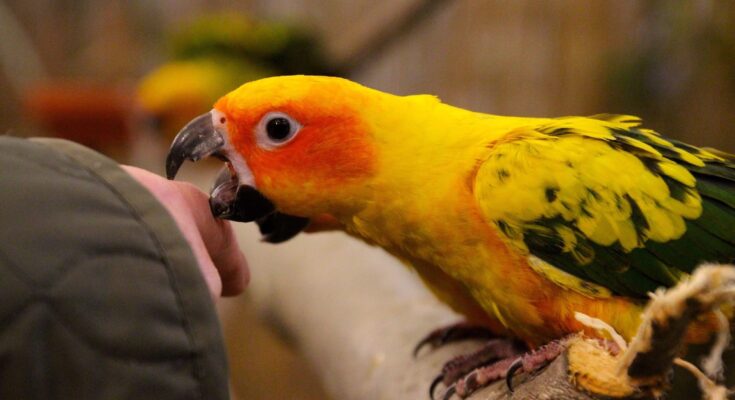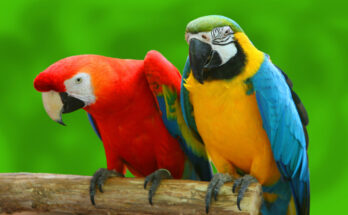Parrots are intelligent, social, and affectionate birds, but sometimes their biting habits can leave owners frustrated, hurt, or even scared. If your parrot has been nipping or biting, don’t worry—you’re not alone.
In this guide, we’ll explain why parrots bite, how to stop parrot biting safely, and the best training techniques to build a positive relationship with your feathered friend.
1. Why Do Parrots Bite?
Before trying to stop parrot biting, it’s important to understand the reason behind it. Birds rarely bite “just because”—there’s usually a cause.
Common Reasons Parrots Bite:
- Fear or stress: New environments, loud noises, or unfamiliar people.
- Territorial behavior: Protecting their cage, toys, or food.
- Lack of training: Parrots need guidance and consistent handling.
- Hormonal changes: During breeding season, aggression can increase.
- Boredom or frustration: Lack of toys, playtime, or stimulation.
- Miscommunication: Parrots use body language—biting may mean they want to be left alone.
👉 Understanding the root cause is the first step toward solving the problem.
2. Signs Your Parrot May Bite Soon
Parrots often give warning signs before biting. Watch for:
- Fluffed-up feathers
- Dilated pupils
- Growling or hissing sounds
- Sudden stillness or freezing
- Lunging movements
👉 If you notice these signs, give your parrot space to prevent escalation.
3. How to Stop Parrot Biting Safely
Now, let’s go over effective and safe methods to reduce or stop biting.
1. Stay Calm and Patient
Never shout, hit, or punish your parrot. This will only make them more fearful and aggressive. Instead, remain calm and consistent.
2. Respect Their Boundaries
If your parrot doesn’t want to be handled, don’t force it. Learn their body language and give them space when needed.
3. Socialize Regularly
Handle your parrot daily, but in short, positive sessions. Gradual exposure to new people and environments can reduce fear and biting.
4. Use Positive Reinforcement
Reward good behavior with:
- Treats (like sunflower seeds, millet, or nuts)
- Praise (“Good bird!” in a happy tone)
- Head scratches (if your parrot enjoys them)
👉 Always reward calm behavior, not aggression.
5. Redirect the Behavior
If your parrot starts to bite, gently place them back on a perch or toy. Redirect their energy toward something positive, like a chew toy.
6. Provide Toys and Stimulation
Biting often comes from boredom. Offer safe chew toys, ropes, bells, and foraging toys to keep them engaged.
7. Train with Step-Up Command
Teach your parrot to step onto your hand or perch when asked. Consistent training helps reduce fear and builds trust.
4. Things You Should Never Do
When trying to stop parrot biting, avoid these mistakes:
- Don’t punish physically – This breaks trust permanently.
- Don’t pull away quickly – It teaches your parrot that biting gets a reaction.
- Don’t ignore warning signs – This can escalate bites.
- Don’t give up – Training takes time, patience, and consistency.
5. Training Tips for Beginners
If you’re new to parrot ownership, here are simple training strategies:
- Start with short sessions (5–10 minutes) daily.
- Use high-value treats your parrot loves.
- Be consistent with commands like “Step Up” and “No Bite.”
- Always end training on a positive note.
- Allow your parrot to set the pace—don’t rush progress.
6. When to Seek Professional Help
If biting continues despite training, consider:
- Consulting an avian vet to rule out health issues.
- Reaching out to a certified parrot trainer or behaviorist.
👉 Sometimes professional guidance makes the process much smoother.
7. Building Trust Takes Time
Remember, parrots are highly intelligent and emotional creatures. If your parrot is biting, it’s often their way of communicating discomfort or fear. With patience, consistency, and love, you can rebuild trust and create a strong bond.
Final Thoughts
Stopping parrot biting isn’t about punishment—it’s about understanding, patience, and positive training. By respecting your bird’s boundaries, providing enrichment, and using positive reinforcement, you’ll soon notice less biting and more bonding.
With time, your parrot will learn to trust you, making your relationship happier and more enjoyable for both of you.




